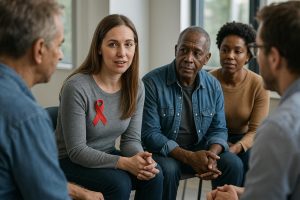Why Support Groups Matter
Living with HIV today means more than managing a virus—it involves navigating emotions, stigma, and healthcare decisions. Although treatments like antiretroviral therapy (ART) have transformed HIV into a manageable condition, emotional and mental well-being remain critical. Support groups fill that gap by offering a safe, judgment-free environment for sharing, learning, and healing. One systematic review highlighted that support groups significantly improve retention in care and quality of life.
Types of HIV Support Groups
- In-person groups: Hosted by clinics or community centers, these allow face-to-face connection, structured discussions, and peer support.
- Online groups: Digital forums and mobile apps—like Positive Peers, myHIVteam, POZ, and THRIVE SS—cater to diverse communities, offering anonymity, forums, and reminders.
- Demographic-specific groups: Tailored to youth, women, Black gay men, etc., these focus on shared cultural and social experiences.
Key Benefits of Joining a Group
- Emotional support & reduced isolation: Members share experiences explicitly tied to living with HIV.
- Improved treatment adherence: Peer encouragement boosts ART commitment and clinic attendance.
- Health education: Reliable info on treatment, prevention, and coping strategies.
- Stigma reduction & disclosure help: Safe space to navigate sensitive topics and societal stigma.
- Peer empowerment & advocacy: Group involvement often leads to leadership opportunities and access to additional resources.
How to Find the Right Support Group
- Check local clinics or HIV service providers.
- Search online platforms: Positive Peers (ages 13–34) and myHIVteam are great options.
- Look for groups matching your identity or community.
- Verify moderation, privacy, and credibility.
- Attend trial meetings to find your fit.
Tips for Getting the Most Out of It
- Engage early and consistently.
- Set approachable participation goals.
- Use hybrid options (online and in-person).
- Respect and honor your comfort boundaries.
- Lean into professional facilitation where available.
Frequently Asked Questions
Q: Can I join an online group anonymously? Yes—many platforms support confidential participation.
Q: Are groups free? Generally yes—most are free or low-cost, supported by nonprofits and health agencies.
Q: Do support groups improve health outcomes? Evidence links them to better ART adherence, viral suppression, and retention in care.
Q: Can they reduce HIV transmission? While they support safer behaviors and disclosure, more research is needed on direct transmission impact.
Disclaimer: This article was written with the assistance of AI and may contain errors.




